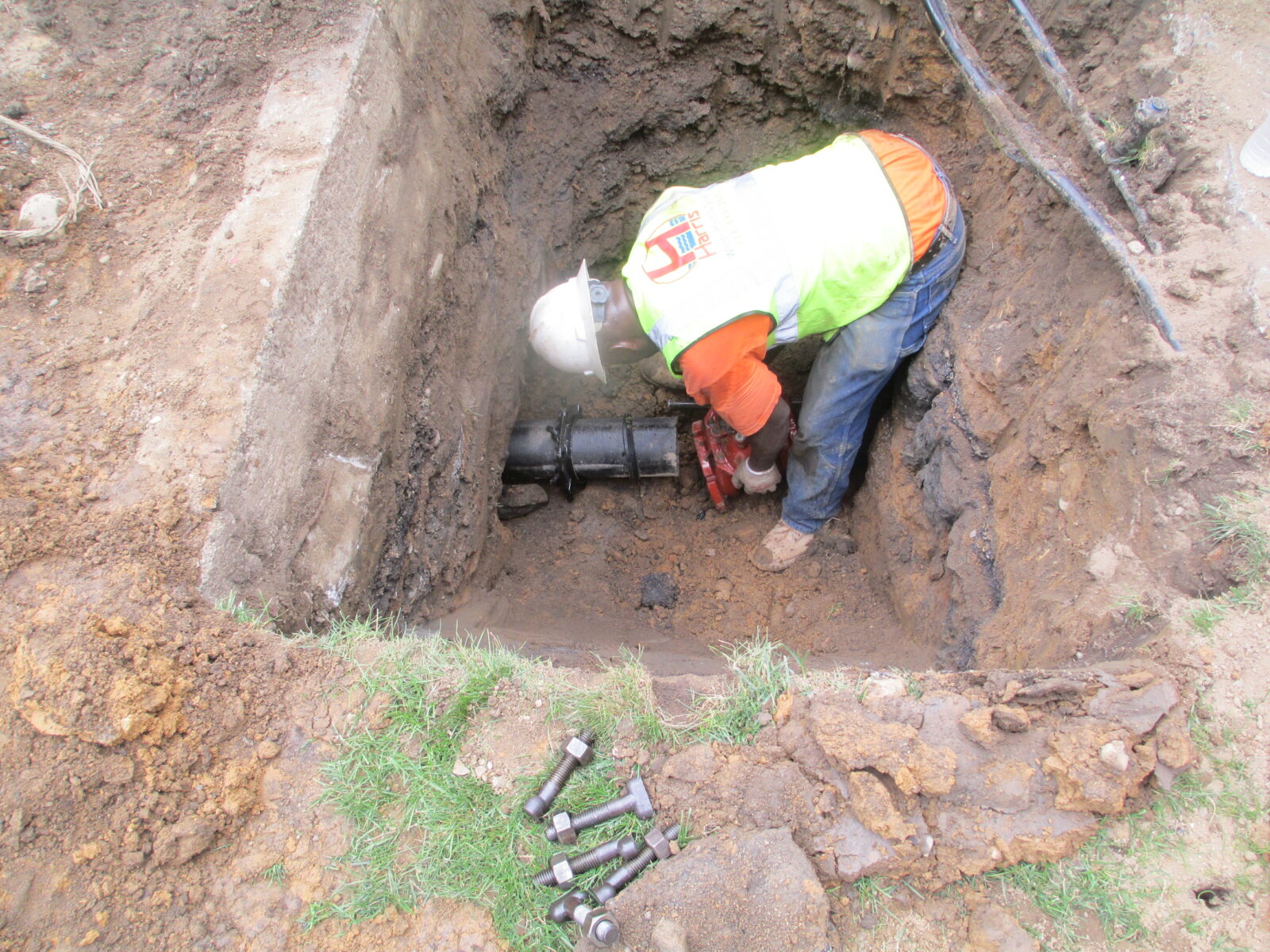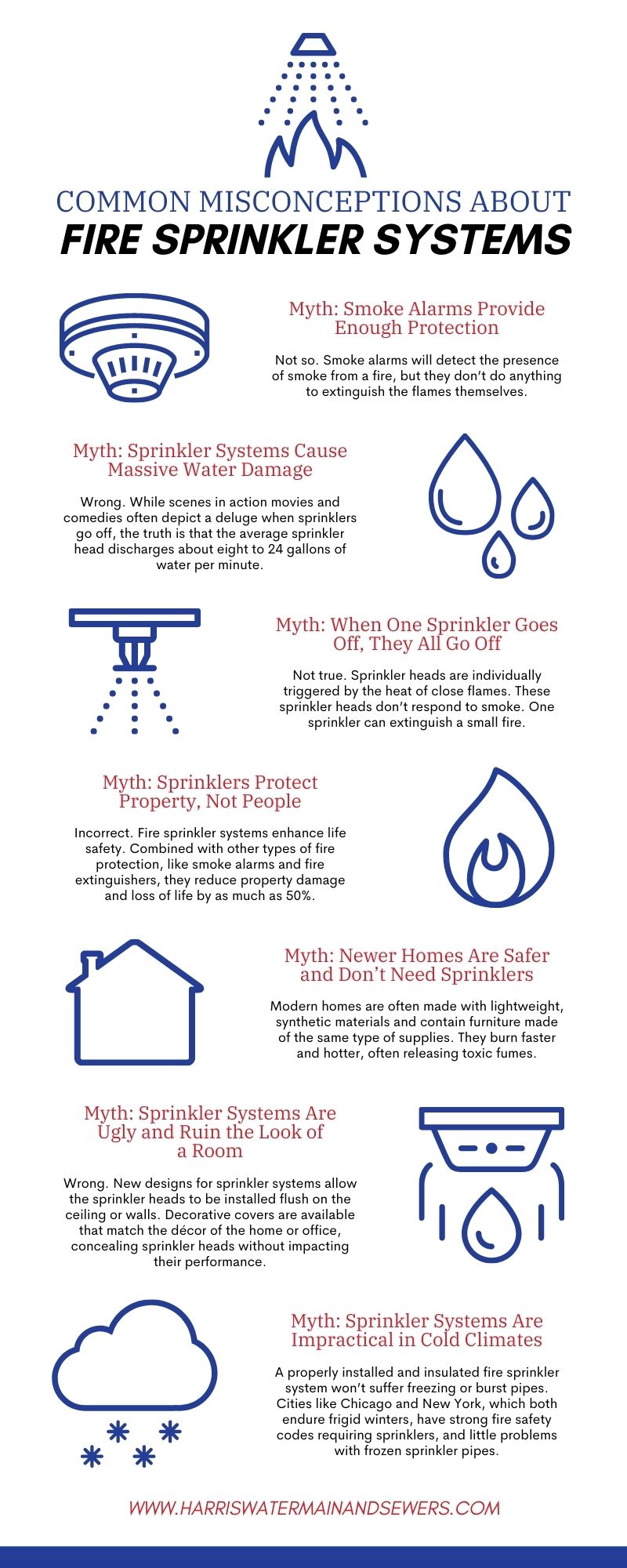Most cities’ building codes require fire sprinkler systems in commercial and some residential buildings. Model building codes for the U.S. recommend that all new construction homes have fire sprinkler systems.
These vital systems protect people and property from catastrophe in the event of a fire. Common misconceptions about fire sprinkler systems perpetuate misunderstandings about how these systems work. These misconceptions can be dangerous, causing homeowners to forego this effective form of protection. Below, we run through several of these myths to aid in the understanding of how fire sprinkler systems work.
Myth: Smoke Alarms Provide Enough Protection
Not so. Smoke alarms will detect the presence of smoke from a fire, but they don’t do anything to extinguish the flames themselves. Sprinklers detect heat from flames and spray water in the location of the fire to put it out.
Myth: Sprinkler Systems Cause Massive Water Damage
Wrong. This is a very common misconception about fire sprinkler systems. While scenes in action movies and comedies often depict a deluge when sprinklers go off, the truth is that the average sprinkler head discharges about eight to 24 gallons of water per minute.
A fire hose, on the other hand, blasts out 80 to 125 gallons of water a minute. That power is why you see more than one firefighter manning the hoses. So, the math is clear: sprinklers cause far less water damage than fire hoses.
Myth: When One Sprinkler Goes Off, They All Go Off
Not true. Sprinkler heads are individually triggered by the heat of close flames. These sprinkler heads don’t respond to smoke. One sprinkler can extinguish a small fire. According to Tufts Public and Environmental Safety, 90% of fires are extinguished by six or fewer sprinklers.
There’s an exception: a deluge sprinkler uses all the sprinkler heads simultaneously. In this type of system, the sprinkler heads go off when their control panel gets a signal from a smoke detector or other device. The sprinkler heads don’t have thermal triggers. Deluge systems are usually installed in highly flammable, hazardous areas.
Myth: Sprinklers Protect Property, Not People
Incorrect. Fire sprinkler systems enhance life safety. Combined with other types of fire protection, like smoke alarms and fire extinguishers, they reduce property damage and loss of life by as much as 50%. Some organizations calculate that loss of life in residential fires is reduced by as much as 80% and property damage by 70% when a fire sprinkler system is installed.
Myth: Newer Homes Are Safer and Don’t Need Sprinklers
Modern homes are often made with lightweight, synthetic materials and contain furniture made of the same type of supplies. They burn faster and hotter, often releasing toxic fumes. Underwriters Laboratory has found that a room built with contemporary materials containing newer furniture with synthetics can reach “flashover,” where the entire room is engulfed in flame in as little as four minutes, whereas an older home built with “legacy” materials like solid wood took as long as 30 minutes to reach that point.
Myth: Sprinkler Systems are Expensive
In commercial and industrial settings without sprinkler systems, damages can be three times as high as they would have been had a sprinkler system been installed. In homes with sprinkler systems, damages average about $2,160, whereas homes without sprinkler systems typically suffer as much as $45,000 in damage.
Where no sprinkler system is present to immediately extinguish the flames, smoke and fire continue to devastate property and threaten lives until firefighters arrive. Sprinklers can control up to 96% of the flames that trigger them, reducing damage from both fire and smoke. In hotels, for example, property damage is 78% lower where sprinkler systems are present.
In high risk or large scale fires, fire officials may choose to defend adjacent buildings rather than attack the main fire, to avoid putting firefighter’s lives at risk. In such cases, building owners could suffer total loss of the structure.
Myth: Sprinkler Systems Are Ugly and Ruin the Look of a Room
Wrong. New designs for sprinkler systems allow the sprinkler heads to be installed flush on the ceiling or walls. Decorative covers are available that match the décor of the home or office, concealing sprinkler heads without impacting their performance.
Myth: Sprinkler Systems Are Impractical in Cold Climates
One of the most common misconceptions about fire sprinkler systems is that the pipes that carry water to the sprinkler heads are prone to freezing or leaks.
A properly installed and insulated fire sprinkler system won’t suffer freezing or burst pipes. Cities like Chicago and New York, which both endure frigid winters, have strong fire safety codes requiring sprinklers, and little problems with frozen sprinkler pipes. In some instances, an anti-freeze agent is added to the water sent through sprinkler systems. Where buildings are vacant, the system may be filled with pressurized nitrogen to ensure that the pipes won’t freeze.
Myth: Sprinkler Systems Don’t Need Maintenance
Sprinkler systems must pass inspections. They connect to city water systems, and underground connections can corrode.
Similarly, systems with a curb valve (required in New York City) are subject to human error and decay. Curb valves can get stuck in the closed position, impacting the system’s ability to operate as it should.
A licensed plumber should inspect a sprinkler system annually to ensure components are in good shape and are operating as they should.
Corroded exterior pipes running underground can cause leaks. In New York City, if the water sprinkler main (the connection to the municipal water supply) is leaking, a master plumber licensed to conduct excavations can provide emergency repairs to meet codes and pass inspection by the Department of Environmental Protection (DEP).
Leaks and stuck valves may indicate an old system in need of replacement. Harris Water Main & Sewer provides quality fire sprinkler installation in New York City. Our experience ensures proper installation and compliance with applicable codes. New installations require excavation, permits, and inspections by both the Department of Buildings (DOB) and the DEP. If your New York City fire sprinkler system is experiencing problems that require repair or replacement, contact Harris for expert help.






















